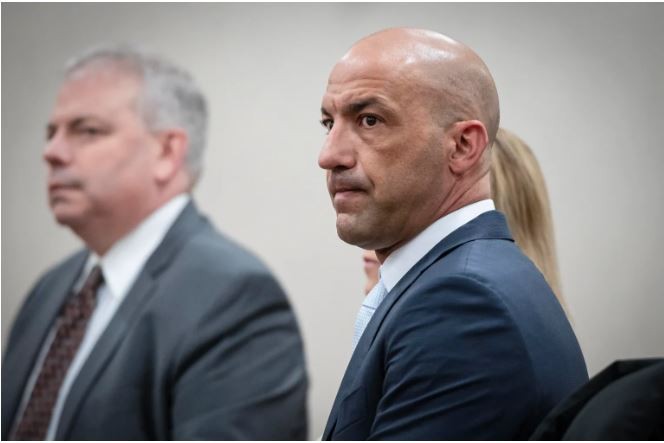Evidence storage becomes hot topic after arrest
thestate.com, Herald-Journal
BYLINE: LYNNE P. SHACKLEFORD and CRAIG PETERS - (Spartanburg) Herald-Journal
Spartanburg County, SC
SPARTANBURG, S.C. -- Spartanburg County officials are working to enhance security in the courthouse evidence locker after the clerk of court was charged last week with stealing drugs stored there.
Methods used by the clerk's office for handling and storing evidence came under scrutiny Tuesday, when federal agents accused Spartanburg County Clerk of Court Marc Kitchens of taking cocaine and methamphetamine from the evidence locker. Kitchens is charged with conspiring with Woodruff real estate developer Terry Glenn Lanford in a scheme to sell the substances to a drug dealer in Florida between April and January.
Probate Court Judge Ponda Caldwell is the acting clerk of court and said she will leave further policy review to her successor, but she has talked with County Administrator Glenn Breed about the need for a keypad entrance and alarm system in addition to the locked entrance now in place. Caldwell said the county is in the process of getting bids on the alarm system and cameras in and around the room.
She said only the assistant clerk of court and Federal Bureau of Investigations agents have access to the locker. The FBI, the Drug Enforcement Administration and the State Law Enforcement Division are taking an inventory of the locker to determine whether any evidence is missing.
Solicitor Trey Gowdy said the agents are working in the conference room in his office and the investigation is ongoing. Gowdy said he doesn't know how many cases - if any - are affected.
Gowdy said he recommends the clerk's office implement procedures similar to the ones recommended by the State Law Enforcement Division and used by several offices in the state, including Greenville County.
Greenville County Clerk of Court Paul Wickensimer said unless a judge orders him to keep evidence in the courthouse vault, he signs it back over to the appropriate law enforcement agency after a trial or plea.
"We prefer not to warehouse evidence here," Wickensimer said. "We do have a vault where we can house those types of items, but law enforcement is better equipped to deal with it."
Wickensimer said although the SLED guidelines aren't mandatory, "we have chosen to adhere to those guidelines. The law enforcement center has a larger place to store evidence, they have a person who manages the room and cameras for security. We choose not to keep evidence longer than we have to."
Gowdy said law enforcement goes to great lengths by wearing gloves and protective clothing, for example, to maintain the integrity of a crime scene from the time they first respond to a call. Officers who process crime scenes log in every piece of evidence and maintain the chain of custody by documenting any review or transfer of evidence up to the time the case goes to trial.
---
'Accountability paramount'
The Spartanburg Public Safety Department and the Spartanburg County Sheriff's Office said protecting evidence is critical. Each agency has a detailed policy that establishes protocol for the storage and supervision of evidence and property.
Inventories are done annually, and unannounced inspections occur each year. The limited-access storage facilities at the sheriff's office and police department have multiple locks, surveillance cameras and highly secure areas for storing guns, drugs, money and valuable items.
David Reeves has worked as an evidence custodian at Spartanburg Public Safety nearly 10 years, and Mylnor Beach has been his partner for almost four. Reeves said the charge against Kitchens prompted him to conduct an inventory of the city's evidence facility, which contains about 57,000 items from about 15,000 cases.
"Accountability is paramount here," Reeves said. "Preserving and protecting evidence is what we're about. A defense attorney can get evidence thrown out if the chain of custody is compromised."
Beach and Reeves said the trust they have in each other is vital, in addition to the checks and balances established by policy.
"If I had a million dollars, (Reeves is) who I'd want to keep it," Beach said.
Shelves of envelopes contain photos and statements - the most common type of evidence - and other envelopes contain videos. Guns and knives are individually placed in boxes, and special bags contain drugs and other evidence. A barcode system is used, and multiple records are kept.
Not every type of evidence fits in an envelope, however, so Reeves built a rack that holds a couple of baseball bats, yard tools and a broken crutch. The city facility also contains a murder room. Reeves said police must keep evidence from a homicide - even those solved and cleared with a conviction - for 75 years.
"Security can't be in question," Reeves said. "I'll put my integrity against anyone in the state. They can come review our evidence locker, and we'll review theirs."
Officers have the responsibility for authorizing disposal of evidence. In arrest cases, they must request court dispositions.
Reeves recently received permission to dispose of five pounds of marijuana from SLED and will take the box to Columbia.
---
Court procedures
When a case is called for trial, an evidence custodian testifies about the chain of custody and verifies that items collected on the day of the crime are what are entered as court exhibits.
S.C. Court Administration issues policy for clerks of court regarding the storage of evidence admitted as exhibits. The policy stresses the importance of accountability systems and restricting access to the exhibit storage area, as well as the importance of inventory lists. But it does not provide requirements for any security/surveillance of the storage area.
Before last week, three people - Kitchens, Assistant Clerk of Court Gail Moffitt and Chief Administrative Assistant Charlena Tinsley - had access to the courthouse exhibit room, Moffitt said.
After a trial is completed, the clerk or the arresting law enforcement agency stores the exhibited evidence until the time for appeals elapses in criminal proceedings, which can be years or decades. The policy establishes a separate procedure for the return or disposal of items in civil cases.
- - - - - - - - - - - - - - - - - - - - - - - - - - - - - - -
International Association for Property and Evidence
"Law Enforcement Serving the Needs of Law Enforcement"
www.IAPE.org
BYLINE: LYNNE P. SHACKLEFORD and CRAIG PETERS - (Spartanburg) Herald-Journal
Spartanburg County, SC
SPARTANBURG, S.C. -- Spartanburg County officials are working to enhance security in the courthouse evidence locker after the clerk of court was charged last week with stealing drugs stored there.
Methods used by the clerk's office for handling and storing evidence came under scrutiny Tuesday, when federal agents accused Spartanburg County Clerk of Court Marc Kitchens of taking cocaine and methamphetamine from the evidence locker. Kitchens is charged with conspiring with Woodruff real estate developer Terry Glenn Lanford in a scheme to sell the substances to a drug dealer in Florida between April and January.
Probate Court Judge Ponda Caldwell is the acting clerk of court and said she will leave further policy review to her successor, but she has talked with County Administrator Glenn Breed about the need for a keypad entrance and alarm system in addition to the locked entrance now in place. Caldwell said the county is in the process of getting bids on the alarm system and cameras in and around the room.
She said only the assistant clerk of court and Federal Bureau of Investigations agents have access to the locker. The FBI, the Drug Enforcement Administration and the State Law Enforcement Division are taking an inventory of the locker to determine whether any evidence is missing.
Solicitor Trey Gowdy said the agents are working in the conference room in his office and the investigation is ongoing. Gowdy said he doesn't know how many cases - if any - are affected.
Gowdy said he recommends the clerk's office implement procedures similar to the ones recommended by the State Law Enforcement Division and used by several offices in the state, including Greenville County.
Greenville County Clerk of Court Paul Wickensimer said unless a judge orders him to keep evidence in the courthouse vault, he signs it back over to the appropriate law enforcement agency after a trial or plea.
"We prefer not to warehouse evidence here," Wickensimer said. "We do have a vault where we can house those types of items, but law enforcement is better equipped to deal with it."
Wickensimer said although the SLED guidelines aren't mandatory, "we have chosen to adhere to those guidelines. The law enforcement center has a larger place to store evidence, they have a person who manages the room and cameras for security. We choose not to keep evidence longer than we have to."
Gowdy said law enforcement goes to great lengths by wearing gloves and protective clothing, for example, to maintain the integrity of a crime scene from the time they first respond to a call. Officers who process crime scenes log in every piece of evidence and maintain the chain of custody by documenting any review or transfer of evidence up to the time the case goes to trial.
---
'Accountability paramount'
The Spartanburg Public Safety Department and the Spartanburg County Sheriff's Office said protecting evidence is critical. Each agency has a detailed policy that establishes protocol for the storage and supervision of evidence and property.
Inventories are done annually, and unannounced inspections occur each year. The limited-access storage facilities at the sheriff's office and police department have multiple locks, surveillance cameras and highly secure areas for storing guns, drugs, money and valuable items.
David Reeves has worked as an evidence custodian at Spartanburg Public Safety nearly 10 years, and Mylnor Beach has been his partner for almost four. Reeves said the charge against Kitchens prompted him to conduct an inventory of the city's evidence facility, which contains about 57,000 items from about 15,000 cases.
"Accountability is paramount here," Reeves said. "Preserving and protecting evidence is what we're about. A defense attorney can get evidence thrown out if the chain of custody is compromised."
Beach and Reeves said the trust they have in each other is vital, in addition to the checks and balances established by policy.
"If I had a million dollars, (Reeves is) who I'd want to keep it," Beach said.
Shelves of envelopes contain photos and statements - the most common type of evidence - and other envelopes contain videos. Guns and knives are individually placed in boxes, and special bags contain drugs and other evidence. A barcode system is used, and multiple records are kept.
Not every type of evidence fits in an envelope, however, so Reeves built a rack that holds a couple of baseball bats, yard tools and a broken crutch. The city facility also contains a murder room. Reeves said police must keep evidence from a homicide - even those solved and cleared with a conviction - for 75 years.
"Security can't be in question," Reeves said. "I'll put my integrity against anyone in the state. They can come review our evidence locker, and we'll review theirs."
Officers have the responsibility for authorizing disposal of evidence. In arrest cases, they must request court dispositions.
Reeves recently received permission to dispose of five pounds of marijuana from SLED and will take the box to Columbia.
---
Court procedures
When a case is called for trial, an evidence custodian testifies about the chain of custody and verifies that items collected on the day of the crime are what are entered as court exhibits.
S.C. Court Administration issues policy for clerks of court regarding the storage of evidence admitted as exhibits. The policy stresses the importance of accountability systems and restricting access to the exhibit storage area, as well as the importance of inventory lists. But it does not provide requirements for any security/surveillance of the storage area.
Before last week, three people - Kitchens, Assistant Clerk of Court Gail Moffitt and Chief Administrative Assistant Charlena Tinsley - had access to the courthouse exhibit room, Moffitt said.
After a trial is completed, the clerk or the arresting law enforcement agency stores the exhibited evidence until the time for appeals elapses in criminal proceedings, which can be years or decades. The policy establishes a separate procedure for the return or disposal of items in civil cases.
- - - - - - - - - - - - - - - - - - - - - - - - - - - - - - -
International Association for Property and Evidence
"Law Enforcement Serving the Needs of Law Enforcement"
www.IAPE.org


